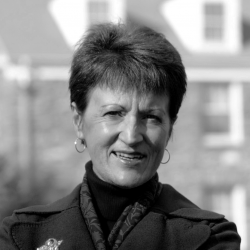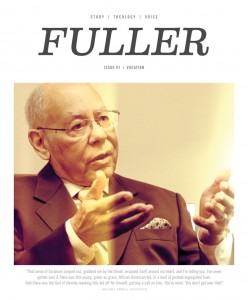The medieval notion of “vocation” is once again in vogue. “Vocational” is no longer a track in the educational world for those who want job training in contrast to university education. The hunger for a sense of “calling” is showing up all over the place—sometimes even without a clear sense of who is doing the calling. Within the Christian community, where the notion of “calling” has never been far from the minds of serious young believers, there seems to be an intensified preoccupation with how to think about one’s place and purpose in the world. Os Guinness’s The Call (Thomas Nelson, 2003), Steve Garber’s Visions of Vocation (InterVarsity Press, 2014), and Tim Keller’s Every Good Endeavor (Dutton, 2012) are three examples of recent works on the topic. For those who want a longer and even more multivaried perspective on calling, they can refer to two collections: Callings: Twenty Centuries of Christian Wisdom on Vocation (Eerdmans, 2005) and Leading Lives That Matter: What We Should Do and Who We Should Be (Eerdmans, 2006).
Perhaps more surprising in this moment is the expansion of language of “calling” and “vocation” to the larger world of higher education. We have the Lilly Endowment, in large part, to thank for this. Their initial invitation to fund proposals at undergraduate education institutions for the “Theological Exploration of Vocation” in the 1990s has expanded into the larger Network for Vocation in Undergraduate Education in partnership with the Council of Independent Colleges. Under this program, more than 80 colleges and universities have received grants to help create a “culture of calling.” This effort is described at length in Shirley Roels’s article “An Education for Life Abundant” in the Winter 2014 edition of the Association of American Colleges and Universities publication Liberal Education—an issue devoted entirely to the theme of “Exploring Purpose and Vocation in College.” Lilly’s focus is not only on undergraduates. They also supported a program on “Presidential Vocation and Institutional Mission,” sponsored by the Council of Independent Colleges, for college and university presidents.1
It is not hard to find reasons for the emergence of renewed interest in “vocation” and “calling.” Apart from the perennial human desire to hear our name amidst the swirl of competing distractions that make up our days, there is the economy—especially, since 2008. Everyone knows someone with a college education who has returned home after graduation to work a minimum wage job and to wander for months or even years without a clear sense of purpose. Most of us know people who lost their jobs during the recession, and with their job, their sense of personal identity and self-worth. The high cost of a college or seminary education in an economy with uncertain job prospects creates pressure on colleges and universities to give more attention to helping their graduates get jobs. It is just plain market savvy, in an increasingly competitive educational marketplace, for institutions to strengthen their programs in career and life planning. Prospective students, and the parents of prospective students, want to know that there will be a salary after graduation commensurate with the student loan payments.
I regret that it has taken the economy and the competition for market niche to encourage churches, colleges, universities, and seminaries to strengthen vocational reflection in their educational programs. We should have been doing this years ago.
Often the very students who flourish best in the academy have the hardest time translating their academic success into life after graduation.
Moreover, life in “real world” jobs never looks like the textbooks. Teaching real students day in and day out is much different from writing lesson plans. Pastoring among any actual congregation of frail, finite, and fallen human beings requires more than the ability to get an “A” in homiletics. Preparing in the healing arts because you want to help people looks quite different in the context of today’s managed care. Doing one’s work well over the long haul is just plain hard. It takes more than a paycheck and competent job skills to sustain one’s energy and creativity through the ups and downs of any work worth doing.
I am delighted that vocation and calling are now receiving the attention and intentionality they deserve in our society. But I am also afraid.
I worry that, in our very zeal to be deliberate about “vocation” and “calling,” we may make this process of understanding one’s life work simpler and more reductionistic than it was ever intended to be.
There is mystery that attends our journey, and we ought not to wish that away.
Real-life callings are usually progressive. Who at 18 or 21 or even 25 can imagine a lifetime of appropriate opportunities or the shape of a life large enough to include all that God might have in store? Most of our 18- or 21- or even 25-year-old selves would shrink in fear and dismay from tasks that life has prepared us for by the time we are called to take them on. God, in mercy, calls us and leads us forth one step at a time.
Real-life callings often have seasons. I see this especially in the lives of men and women whose sense of “calling” encompasses both family and employment. It used to be that primarily women struggled to imagine a call that could include marriage, family, and a task in the world. Work and family are still not automatically assumed to go together for young women, especially in the Christian world. But, thankfully, I am seeing more and more young couples who are seeking creatively to live out God’s call on each of their lives as individuals, as well as on their life together as a couple. Neither women nor men can “have it all” all at once—or at any one time in their journey. The wholeness of calling emerges out of the total cycle of changing seasons.
Real-life callings often emerge only retrospectively. Just recently, I heard a highly accomplished seminary administrator reflect in wonder at the way God had pieced together his life in a coherent whole—enabling him to make a contribution that he could never possibly have known enough to intend from a vantage point earlier in his journey. We can see much more clearly looking backward how things fit together—or were made to fit together—by superintending hands not our own. As my grandfather wisely told me long ago, “Shirley, in God’s economy, nothing is wasted.” I saw that tangibly in my own life. The two years I spent in student development work between my master’s and doctoral degree—two years that my mentor clearly viewed as “diversionary”—turned out to be seminal in my own personal and professional development.
Real-life callings are often confusing. I think of the journeys of Joseph and Daniel in the Old Testament. Who feels “called” to Pharaoh’s prison or to the fiery furnace? Or take Dietrich Bonhoeffer or Carolyn Paine Miller in our own time. Why would a call to serve the German church as a pastor and theologian include participation in a plot to kill Adolf Hitler? And if Bonhoeffer had indeed heard the call correctly, why would he end up in prison? The last lines of his haunting poem “Who Am I?” say it all: “Who am I? They mock me, these lonely questions of mine. Whoever I am, thou knowest, O God, I am thine.”2 How could Carolyn Paine Miller’s call to be a Wycliffe Bible translator in Vietnam include eight months in Viet Cong captivity? And why would God allow the captors to seize the precious manuscripts that contained years of obedient work?
Real-life callings are complex. We are rarely called simply to one thing at a time. We are called to do good work, to be effective parents, to be loving spouses, supportive children, wise mentors, and nurturing friends in the context of one’s called life. Callings do not come with specific instructions about proportioning our time, or exactly how much effort is “enough” to have fulfilled our responsibility.
We might prefer that our callings come with the clarity of military or medical orders. Instead they present themselves more like material to the artist: “Here is the clay. Make something beautiful.”
Real-life callings are as much shaped by circumstances as by intention. As a young adult, I felt drawn almost naturally to the profession of teaching. It was the “calling” most modeled for me as a “faculty kid” growing up in a college town. It was an easy move—relatively—to get a doctoral degree and to move into the role of college professor. What was not so easy was understanding why, 15 years later, I kept getting asked to do more and more within the world of administration. I struggled and fought this direction for my life. Like Moses, I protested that I did not have the right gifts. I am a person of the cubicle and the classroom, not the platform. In the end, however, I have come to believe that the needs of our communities can, at least sometimes, legitimately constitute a call on our own lives.
If we are to understand calling, it behooves us to return often to the Scriptures. Sometimes God calls us through expansive and general invitations to freedom and creativity. “Enjoy the Garden. Of every tree but one, you may freely eat” (Genesis 2). Occasionally God calls us to specific tasks that need to be done—whether or not we feel especially gifted for the work. In those circumstances, we, like Gideon, are invited to “Go in the strength that you have. I will be with you” (Judges 6). Always God is at work in the midst of our work—bringing good out of what others intended for evil in our journeys (e.g., Joseph, Genesis 50) and using all the circumstances of our lives to move us toward our ultimate calling to be conformed to the image of his Son—our Lord and Savior Jesus Christ (Romans 8:28).
I have expended mounds of energy—especially at certain junctures of my journey—worrying about how to understand God’s call on my own life. I have spent countless hours with college students who are trying to sort out what it means to listen for God’s call as they embark on their adult journey. I am inspired by the renewed effort in our churches and in our educational institutions—including Fuller—to focus deliberate attention on the themes of calling and vocation. But before and after and in the midst of our best intent to understand vocation and calling, we cannot do better than to cultivate the fourfold discipline of Psalm 37:3–7: “Trust in the lord, and do good; . . . Take delight in the lord; . . . Commit your way to the lord; . . . Be still before the lord and wait patiently for him.” We can take comfort and inspiration from the powerful words of Oxford theologian and philosopher Austin Farrer: “God leaves no factors out of his reckoning, nor does he plan for an imaginary virtue we haven’t got, he plans for the very [people] we are. His plans for us are what perfect wisdom suggests to infinite love.”3


